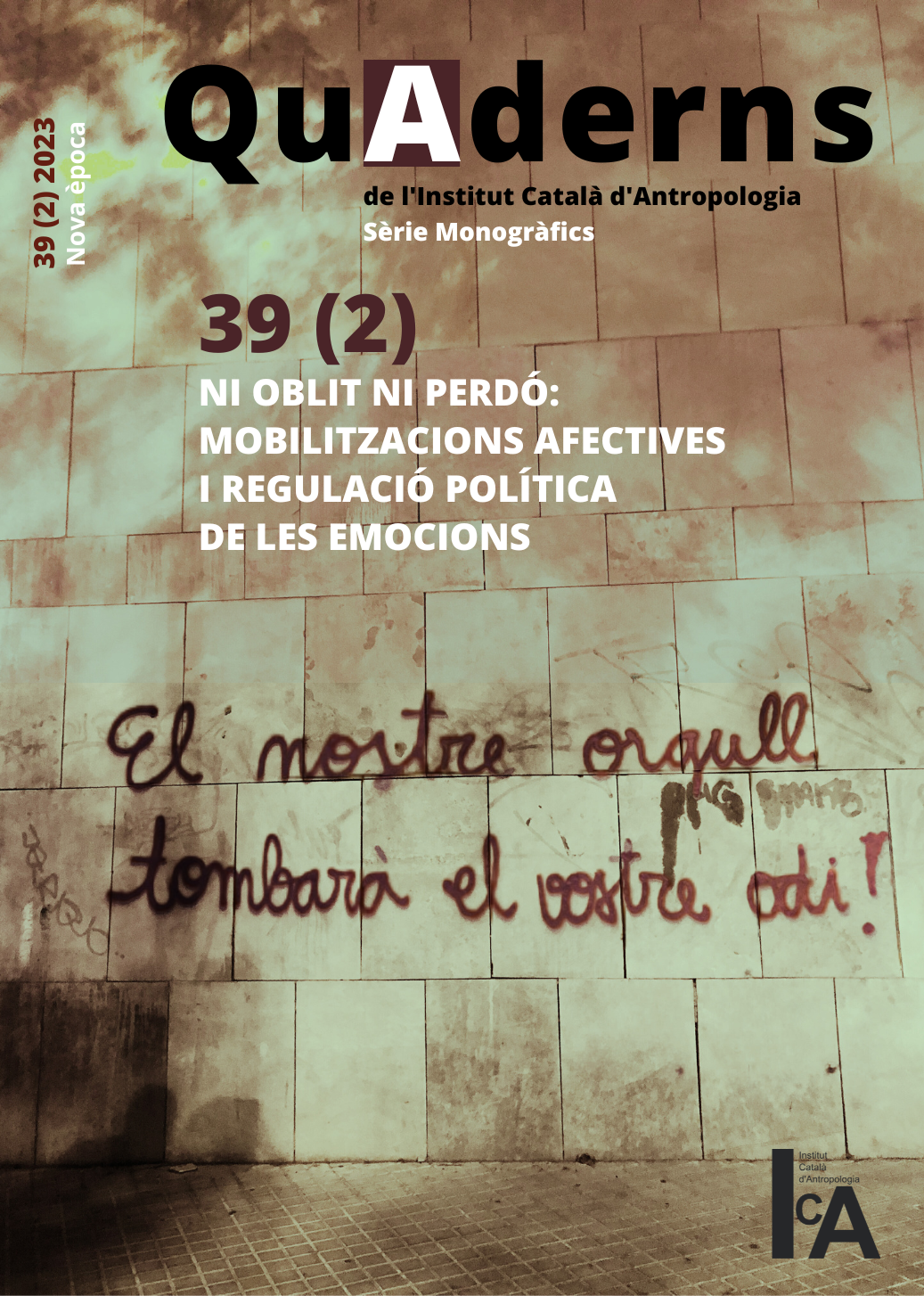Ni oblit ni perdó: mobilitzacions afectives i regulació política de les emocions. Presentació
DOI:
https://doi.org/10.56247/qua.491Paraules clau:
mobilitzacions, política, emocionsResum
Presentació
Descàrregues
Global Statistics ℹ️
|
547
Views
|
324
Downloads
|
|
871
Total
|
|
Referències
Ahmed, S. (2004). Affective Economies. Social Text, 22(2), 117-139. DOI: https://doi.org/10.1215/01642472-22-2_79-117
Ahmed, S. (2017). La política cultural de las emociones. Universidad Nacional Autónoma de México.
Barad, K. (2007). Meeting the universe halfway: Quantum physics and the entanglement of matter and meaning. Duke University Press. DOI: https://doi.org/10.2307/j.ctv12101zq
Bargetz, B. (2014). Mappin Affect. Challenges of (Un)timely Politics. En M.-L. Angere, B. Bösel i M. Ott (eds.), Timing of Affect. Epistemologies, Aesthetics, Politics (pp. 289-302). Diaphanes AG.
Bargetz, B. (2020a). A Political Grammar of Feelings. Thinking the Political Through Sensitivity and Sentimentality. En T. Bedorf i S. Herrmann (eds.), Political Phenomenology. Experience, Ontology, Episteme (pp. 52-70). Routledge. DOI: https://doi.org/10.4324/9780429259852-4
Bargetz, B. (2020b). The sentimental contract: Ambivalences of affective polítics and públics. En A. Fleig i C. Von Scheve (eds.), Public Spheres of Resonance: Constellations of Affect and Language (pp. 63-80). Routledge. DOI: https://doi.org/10.4324/9780429466533-6
Bayard de Volo, L. (2006). The Dynamics of Emotions and Activism: Grief, Gender, and Collective Identity in Revolutionary Nicaragua. Mobilization: An Internacional Quarterly, 11(4), 461-474. DOI: https://doi.org/10.17813/maiq.11.4.q21r3432561l21t7
Beatty, A. (2014). Anthropology and Emotion. Journal of the Royal Anthropological Institute, 20(3), 545-563. DOI: https://doi.org/10.1111/1467-9655.12114
Berlant, L. (2020). El optimismo cruel. Caja Negra.
Clough, P.T. i Halley, J. (2007). The Affective Turn. Theorizing the Social. Duke University Press. DOI: https://doi.org/10.2307/j.ctv11316pw
Closs Stephens, A. (2016). The affective atmosferes of nationalism. Cultural Geographies, 23, 181-198. DOI: https://doi.org/10.1177/1474474015569994
Clua i Fainé, M. (2014). Identitat y política en Cataluña: el auge del independentismo en el nacionalismo catalán actual. Quaderns-e de l’Institut Català d’Antropologia, 19(2), 79-99.
DeLanda, M. (2016). Assemblage Theory. Edinburgh University Press. DOI: https://doi.org/10.1515/9781474413640
Della Porta, D. (1995). Social moviments, political violence, and the State. Cambridge University Press. DOI: https://doi.org/10.1017/CBO9780511527555
De Sena, A. (ed.) (2014). Las políticas hechas cuerpo y lo social devenido emoción: lecturas sociológicas de las políticas sociales. Estudios Sociológicos Editora.
Diz, C. (2019). Maneras de vivir: emoción, política e identidades en movimiento. ANDULI, Revista Andaluza de Ciencias Sociales, 18, 93-117. DOI: https://doi.org/10.12795/anduli.2019.i18.05
Enguix Grau, B. (2020). ‘Overflown bodies’ as critical-political transformations. Feminist Theory, 21(4), 465-481. DOI: https://doi.org/10.1177/1464700120967328
Enguix Grau, B. (2021). Rebel Bodies: Feminism as Resistance in the Catalan pro-Independence Left. European Journal of English Studies, 25(2), 225-248. DOI: https://doi.org/10.1080/13825577.2021.1944489
Enguix Grau, B. (2022a). Entre la espada y la pared: cuerpo, género y posthumanismo. En J. Martí i B. Enguix (eds.), Pensar la antropología en clave posthumanista (pp. 47-72). CSIC-Biblioteca de Antropología.
Enguix Grau, B. (2022b). Cossos i gèneres en transició: el posthumanisme i els seus efectes. En F. Núñez i A. Vayreda (eds.), Humanisme i Posthumanisme. Eines per a unes ciències humanes en moviment (pp. 111-147). Editorial UOC.
Enguix Grau, B. (2023). Feminist futures? Gender and nation in the pro independence left in Catalonia. European Journal of Women’s Studies, 30(2), 214-233. DOI: https://doi.org/10.1177/13505068231164774
Esteban, M.L. (2011). Crítica del pensamiento amoroso. Temas contemporáneos. Bellaterra Edicions.
Flam, H. (2005). Emotions’ map. A research agenda. En H. Flam i D. King (eds.), Emotions and Social Movements (pp. 19-40). Routledge.
Gammerl, B. (2012). Emotional styles – concepts and challenges. Rethinking History, 16(2), 161-175. DOI: https://doi.org/10.1080/13642529.2012.681189
Generalitat de Catalunya (2017). Nota de premsa: El Govern trasllada els resultats definitius del referèndum de l’1 d’octubre al Parlament de Catalunya. Direcció General de Comunicació. https://govern.cat/salapremsa/notes-premsa/303541/govern-trasllada-resultats-definitius -del-referendum-1-octubre-al-parlament-catalunya
Goodwin, J., Jasper, J. i Polletta, F. (2000). The Return of the Repressed: The Fall and Rise of Emotions in Social Movement Theory. Mobilization: An International Quarterly, 5(1), 65-84. DOI: https://doi.org/10.17813/maiq.5.1.74u39102m107g748
Gould, D. (2004). Passionate political processes: bringing emotions back into the study of social movements. En J. Goodwin i J. Jasper (eds.), Rethinking social movements: Structure, meaning, and emotion (pp. 155-176). Rowman & Littlefield Publishers.
Gould, D. (2009). Moving Politics: Emotion and ACT UP’s Fight Against AIDS. University of Chicago Press. DOI: https://doi.org/10.7208/chicago/9780226305318.001.0001
Gravante, T. i Poma, A. (2019). Emociones, trauma cultural y movilización social: el movimiento por las víctimas de Ayotzinapa en México. Perfiles Latinoamericanos, 27(53), 1-23. DOI: https://doi.org/10.18504/pl2753-007-2019
Hochschild, A.R. (1975). The sociology of feeling and emotion: Selected possibilities. En M. Millman i M. Kanter (eds.), Another Voice (pp. 280-307). Anchor. DOI: https://doi.org/10.1111/j.1475-682X.1975.tb00339.x
Hochschild, A.R. (1979). Emotion Work, Feeling Rules, and Social Structure. American Journal of Sociology, 85, 551-575. DOI: https://doi.org/10.1086/227049
Hochschild, A.R. (2003). The Managed Heart: Commercialization of Human Feeling. University of California Press. DOI: https://doi.org/10.1525/9780520930414
Hochschild, A.R. (2008). Emotion work, feeling rules, and social structure. En M. Greco i P. Stenner (eds.), Emotions: A Social Science Reader (pp. 121-126). Routledge.
ICPS, Institut de Ciències Polítiques i Socials (2013). Sondeig d’opinió de Catalunya 2013. Institut de Ciències Polítiques i Socials (ICPS).
Jasper, J. (1998). The art of moral protest: culture, biography, and creativity in social moviments. University of Chicago Press. DOI: https://doi.org/10.7208/chicago/9780226394961.001.0001
Jasper, J. (2014). Feeling-Thinking: Emotions as Central to Culture. En P. Daphi. B. Baumgarten i P. Ullrich (eds.), Conceptualizaing Culture in Social Movement Research (pp. 23-44). Palgrave Macmillan UK. DOI: https://doi.org/10.1057/9781137385796_2
Jasper, J. i Owens, L. (2014). Social Movements and Emotions. En J. Stets i J. Turner (eds.), Handbook of the Sociology of Emotions: Volume II (pp. 529-548). Springer. DOI: https://doi.org/10.1007/978-94-017-9130-4_25
Jasper, J. i Poulsen, J.D. (1995). Recruiting Strangers and Friends: Moral Shocks and Social Networkds in Animal Rights and Anti-Nuclear Protests. Social Problems, 42(4), 493-512. DOI: https://doi.org/10.2307/3097043
JEC, Junta Electoral Central (2006). Resolución de 3 de julio de 2006, de la Junta Electoral Central, de declaración oficial de los resultados del referèndum sobre reforma del Estatuto de Autonomía de Cataluña. Boletín Oficial del Estado, núm. 158 (pp. 25193-25194), 4 de juliol de 2006.
Labanyi, J. (2010). Doing Things: Emotion, Affect, and Materiality. Journal of Spanish Cultural Studies, 11(3-4), 223-233. DOI: https://doi.org/10.1080/14636204.2010.538244
Lara, A. (2020). Mapeando los Estudios del Afecto. Athenea Digital, 20(2). DOI: https://doi.org/10.5565/rev/athenea.2812
Le Breton, D. (1999). Las pasiones ordinarias. Antropología de las emociones. Nueva visión.
Le Breton, D. (2012). Por una antropología de las emociones. Revista Latinoamericana de Estudios sobre Cuerpos, Emociones y Sociedad, 4(10), 69-79.
Lutz, C. i White, G.M. (1986). The Anthropology of Emotions. Annual Review of Anthropology, 15, 405-436. DOI: https://doi.org/10.1146/annurev.anthro.15.1.405
Martí, J. (2019). Sons i revolta a l’escenari polític català. Quaderns de l’Institut Català d’Antropologia, 23(2), 80-98.
Martí, J. (2020). Paisatges emocionals i identitats polaritzades a la Catalunya del Procés. Revista d’Etnologia de Catalunya, 45, 105-121.
Massumi, B. (2002). Parables for the Virtual: Movement, Affect, Sensation. Duke University Press. DOI: https://doi.org/10.1215/9780822383574
Massumi, B. (2015). Politics of Affect. Polity Press.
Mendoza, D. (2021). Mirando al Sur. Una historia (incompleta) de los activismos de la disidencia sexual y del género en Andalucía. Tesis doctoral, Universidad de Granada.
Neville-Shepard, R. i Neville-Shepard, M. (2021). The pornified presidency: hyper-masculinity and the pornographic style in U.S. political rhetoric. Feminist Media Studies, 21(7), 1193-1208. DOI: https://doi.org/10.1080/14680777.2020.1786429
Pichel-Vázquez, A. i Enguix, B. (2021). Framing Gender through Affects: Antifeminism and Love in the Spanish Far Right (Vox). South European Society and Politics, 26(4), 465-487. DOI: https://doi.org/10.1080/13608746.2022.2115185
Polletta, F. i Jasper, J. (2001). Collective Identity and Social Movements. Annual Review of Sociology, 27, 283-305. DOI: https://doi.org/10.1146/annurev.soc.27.1.283
Poma, A., Paredes, J.P. i Gravante, T. (2017). Resistencias y emociones del activismo en contextos represivos, autoritarios o violentos. Una introducción. Polis, 53, 1-10.
Puig de la Bellacasa, M. (2009). Touching tecnologies, touching visions: The reclaim of sensorial experience and the politics of speculative thinking. Subjectivity, 28, 297-315. DOI: https://doi.org/10.1057/sub.2009.17
Ramírez Goicoechea, E. (2001). Antropología “compleja” de las emociones humanas. Isegoría, 25, 177-200. DOI: https://doi.org/10.3989/isegoria.2001.i25.589
Rosaldo, M. (1984). Toward an Anthropology of Self and Feeling. En R.A. Shweder y R.A. LeVine (eds.), Culture Theory: Essays on Mind, Self, and Emotion (pp. 137-157). Cambridge.
Sauer, B. (2019). Mobilizing shame and disgust: abolitionist affective frames in Austrian and German anti-sex-work moviments. Journal of Political Power, 12(3), 319-338. DOI: https://doi.org/10.1080/2158379X.2019.1669262
Scribano, A. (2017). Amor y acción colectiva: Una mirada desde las prácticas intersticiales en Argentina. Aposta: Revista de Ciencias Sociales, 74, 241-280.
Solana, M. i Vacarezza, N.L. (2020). Sentimientos feministas. Revista de Estudos Feministas Florianópolis, 28(2). DOI: https://doi.org/10.1590/1806-9584-2020v28n272445
Stewart, K. (2017). In the world that affect proposed. Cultural Anthropology, 32(2), 192-219. DOI: https://doi.org/10.14506/ca32.2.03
Thrift, N. (2008). Non-Representational Theory: Space, Politics, Affect. Routledge. DOI: https://doi.org/10.4324/9780203946565
Van Ness, J. i Summers-Effler, E. (2018). Emotions in Social Movements. En D.A. Snow, S.A. Soule, H. Kriesi i H.J. McCammon (eds.), The Wiley Blackwell Companion to Social Movements (pp. 411-428). John Wiley & Sons. DOI: https://doi.org/10.1002/9781119168577.ch23
Víctoria, C. i Coelho, M.C. (2019). A antropologia das emoções: conceitos e perspectives teóricas em revisão. Horizontes antropológicos, 25(54), 7-21. DOI: https://doi.org/10.1590/s0104-71832019000200001
Wetherell, M. (2012). Affect and Emotion: A New Social Science Understanding. Sage. DOI: https://doi.org/10.4135/9781446250945
Descàrregues
Publicades
Com citar
Número
Secció
Llicència
(CC BY-NC-SA 4.0)




